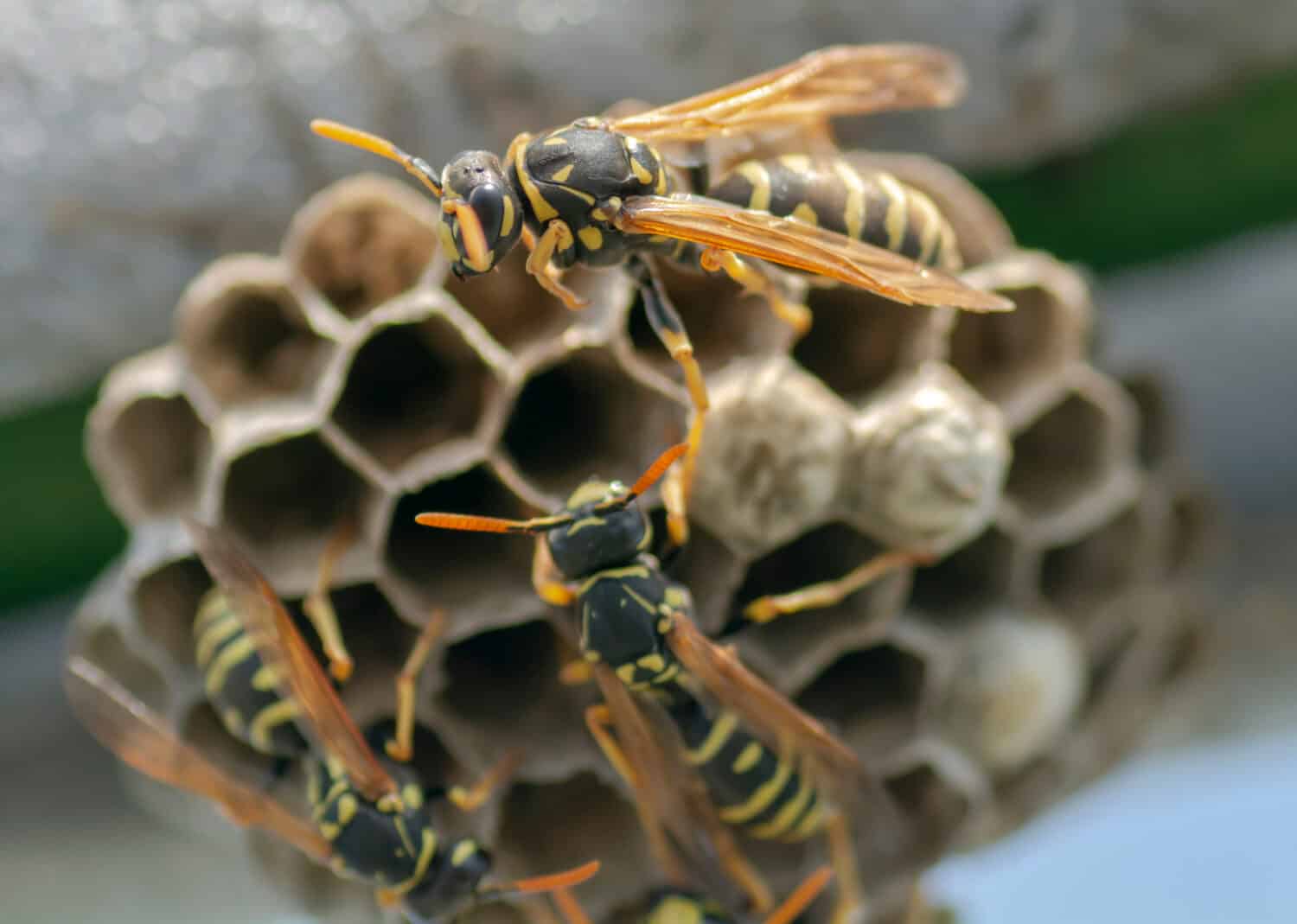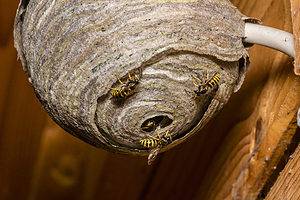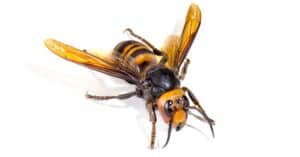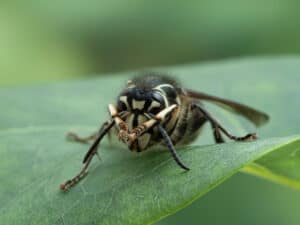Many people consider summer the best time of the year. Days full of beach trips and ice-cold lemonade, nights full of s’mores and the buzzing of cicadas. It’s easy to get caught up in all the perks summer has to offer, but it’s important to remember that this time of year is the peak of wasp and hornet activity. Many people have had a stressful experience with these stinging insects at least once in their lives. Whether this is your first time or your hundredth time encountering them, it’s always a smart idea to be prepared. Let’s go over 5 things you should never do when dealing with a wasp nest.
1. Don’t Poke a Wasp Nest
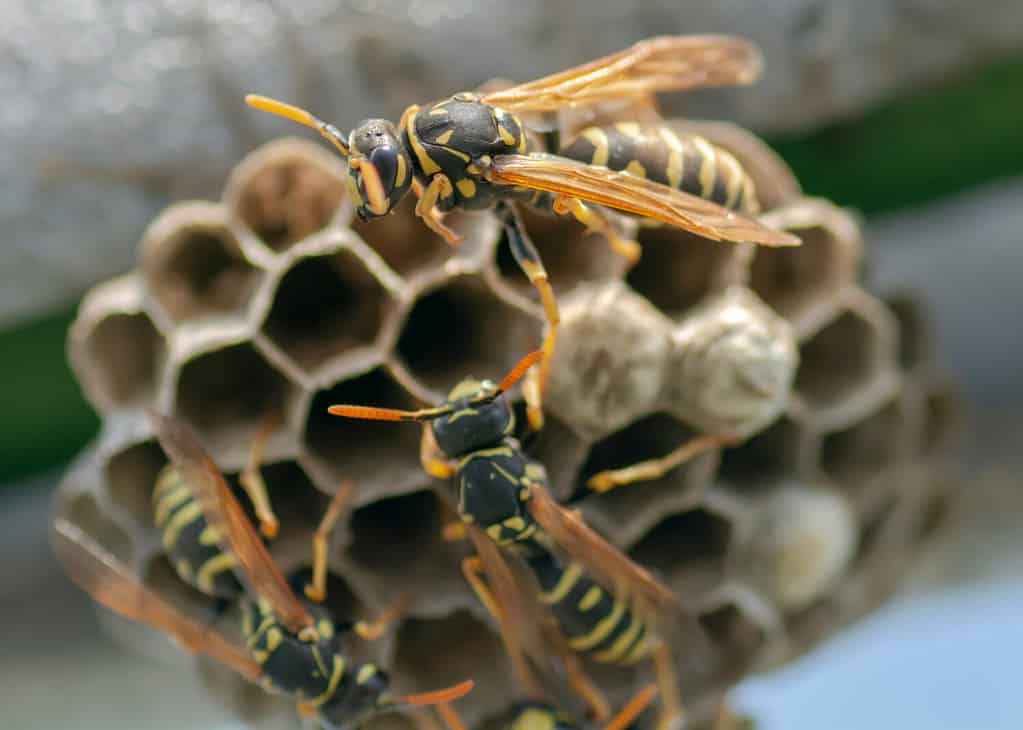
Wasp nests are commonly made of chewed wood, giving the exterior a natural, papery look.
©Stefan_Sutka/Shutterstock.com
Have you ever seen one of those viral videos of someone taking a stick or a bat to a wasp nest? They always end the same, with the individual covered in a swarm of angry insects. Wasps are not like their bee counterparts. Hornets and yellowjackets, which are two types of wasps, have a reputation for being more aggressive, and their stings can be more powerful and painful. The bottom line is that they will become protective if they feel threatened. They have an innate drive to defend their colony and their nest. Instead of provoking their fight response, try to keep a safe distance whenever possible.
2. Don’t Let Children or Those with Wasp Allergies Near a Nest
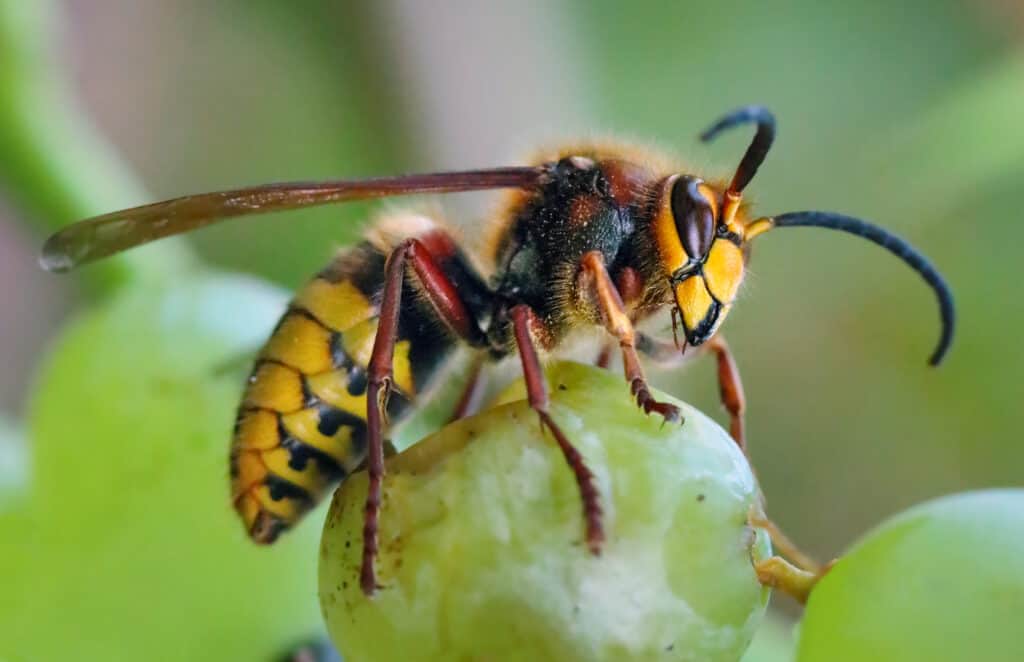
The European hornet is easily recognizable, with its bright yellow coloring and black bands on its abdomen.
©TTstudio/Shutterstock.com
Another essential thing to keep in mind is that wasps are capable of stinging their target several times. In addition to this, they are known to chase their prey up to a distance of 100 feet around their nest. This is made more difficult when dealing with wasps that live underground, as you may not know you accidentally stumbled over their nest until it’s too late. If you’re particularly unlucky, you may even need to see a doctor after a wasp attack, depending on the severity. Complications can arise even for the healthiest individuals. If you’re allergic or have small children, it’s even more dangerous. Don’t risk it!
3. Don’t Cover the Nest Up
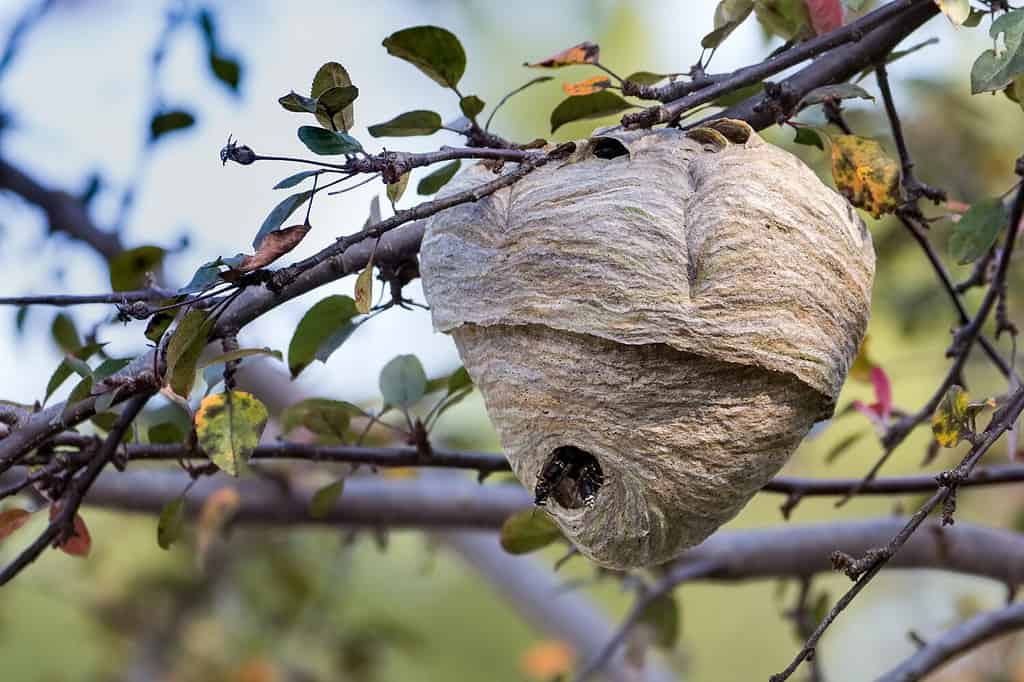
Bald-faced hornets have a powerful sting and are capable of stinging their victim multiple times.
©Manu M Nair/Shutterstock.com
Covering the entrance to the nest can seem like an appealing idea. If the wasps have no way in or way out, they’re bound to die off, right? Well, think again. Wasps are resilient and intelligent creatures. Let’s say you’re dealing with a wasp nest attached to your home. If you attempt to block the entrance of the nest, it’s likely that the wasps will simply start creating a new opening by any means possible. The worst part is that they don’t have the ability to distinguish between your house and their nest, so they’ll just burrow a hole in whatever direction they feel is best. If they see an opportunity to get back into their nest, they’ll take it, and in the process, they could accidentally dig a pathway into your home. If this happens, the inconvenience is more significant, and the danger is increased.
4. Don’t Engage in Dangerous Behavior
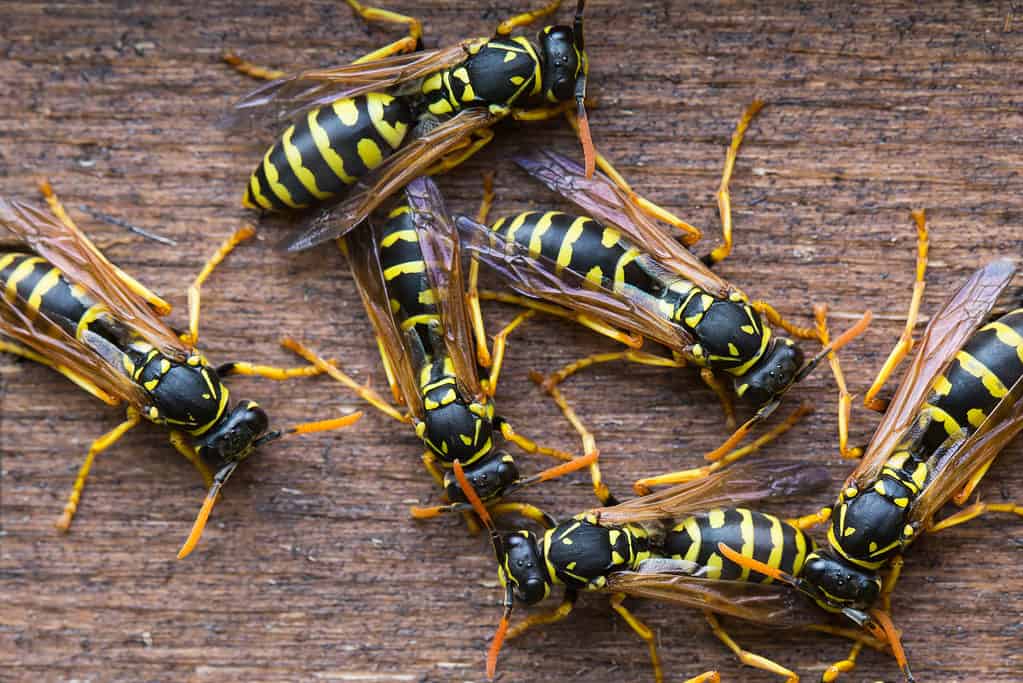
In an attempt to defend themselves, wasps won’t hesitate to launch a coordinated attack.
©FCerez/Shutterstock.com
Unsurprisingly, even a small amount of carelessness can cause serious bodily injury when dealing with a wasp nest. For example, the use of fire or gasoline might appear to be an easy way to take care of the problem. However, doing this can quickly become a fire hazard. You wouldn’t want to endanger your family or neighbors in the process of removal, so refrain from trying to burn the nest altogether. It’s also never a good idea to get up on a ladder in an attempt to dispatch a wasp nest. If a nest is in a hard-to-reach spot where a ladder would be required for its removal, it’s best to call an exterminator instead. The chance of being attacked by the protective colony is high, which may cause you to fall off and injure yourself in the process.
5. If Possible, Don’t Do Anything
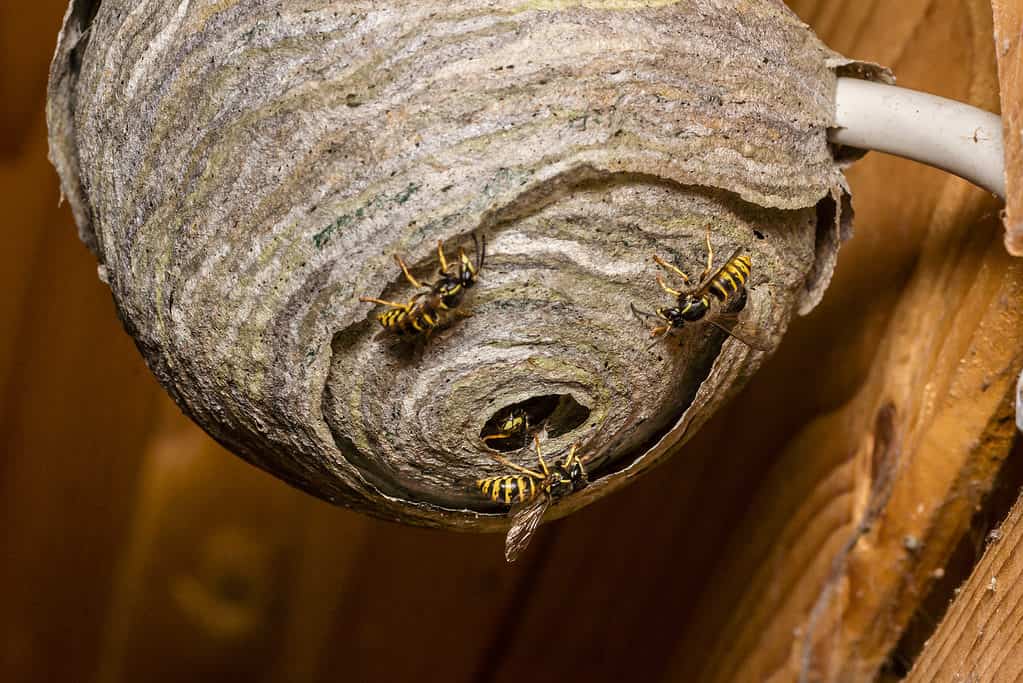
Wasps are most aggressive when someone disturbs or threatens their nest.
©iStock.com/SKatzenberger
Sometimes, it’s best not to do anything to a wasp nest. Let’s consider the location of the wasp nest. If it’s a far enough distance away from you and your family, and the chance of getting stung is low, consider leaving it alone. The truth is, wasps are just as inconvenienced by us as we are by them. All they really want is to pollinate peacefully and protect their nest, and who can blame them? Allowing nature to take its course might be the best choice of all. When the cold temperatures of fall and winter come around, the changing seasons will naturally eliminate the wasps. Their natural lifespan is no longer than a few months, so if you can wait it out, the first frost can serve as your easy, free exterminator.
Final Thoughts
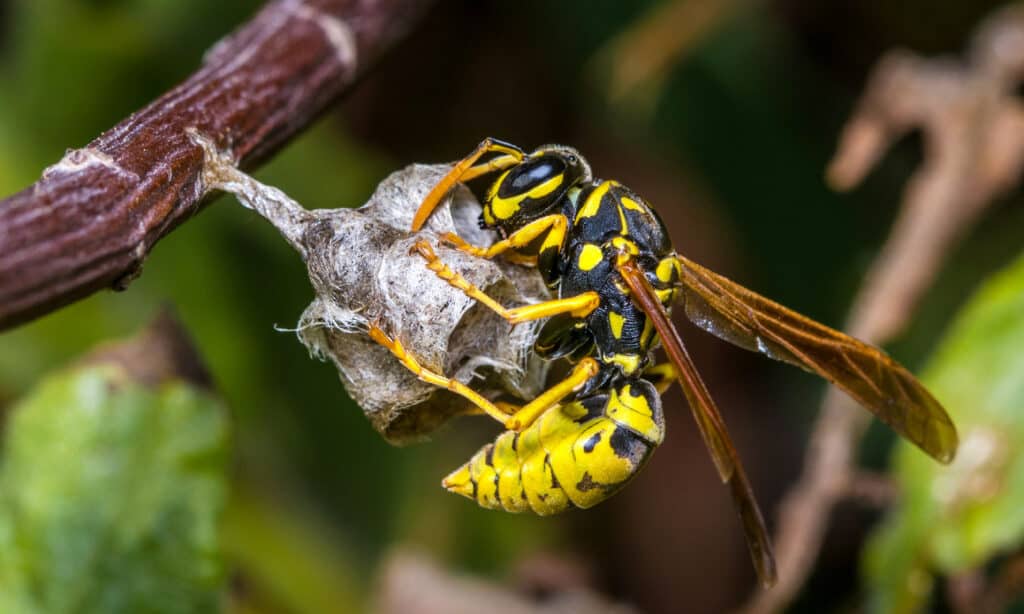
There are many different species of wasps and hornets, so the best course of action may differ depending on which one you’re dealing with.
©JorgeOrtiz_1976/Shutterstock.com
If you’re determined to take action, there are exterminator-approved products on the market that can help. First, wear protective gear and approach the nest at night when the wasp’s activity is the lowest. You can then creep up to the nest cautiously before covering it with an approved pesticide or dust spray. If you have any doubts about your capability, don’t risk it.
As always, hiring a professional exterminator is usually the best choice. Exterminators undergo extensive training to handle these situations properly, ensuring the best possible outcome. What you spend on their services will be worth all the stress you’ll save yourself.
| Don’t Do This | Do This Instead |
|---|---|
| Hit or poke the wasp nest | Stay a safe distance away and do as little to provoke the wasps as possible |
| Put yourself or others in a dangerous situation | Keep children or those with allergies indoors, or as far away from a wasp nest as possible |
| Try to cover the wasp nest | Use specialized pesticide or dust sprays on the nest while wearing protection |
| Take extermination into your own hands | Talk to a professional and see what the safest solution is |
Thank you for reading! Have some feedback for us? Contact the AZ Animals editorial team.

